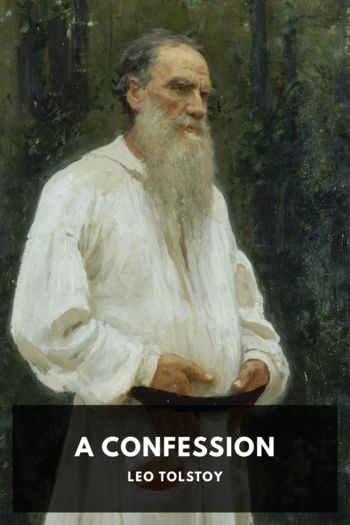Anna Karenina by Leo Tolstoy (feel good books TXT) 📕

- Author: Leo Tolstoy
Book online «Anna Karenina by Leo Tolstoy (feel good books TXT) 📕». Author Leo Tolstoy
The horse, stiffening out its legs, with an effort stopped its rapid course, and the officer of the horse-guards looked round him like a man waking up from a heavy sleep, and just managed to smile. A crowd of friends and outsiders pressed round him.
Vronsky intentionally avoided that select crowd of the upper world, which was moving and talking with discreet freedom before the pavilions. He knew that Madame Karenina was there, and Betsy, and his brother’s wife, and he purposely did not go near them for fear of something distracting his attention. But he was continually met and stopped by acquaintances, who told him about the previous races, and kept asking him why he was so late.
At the time when the racers had to go to the pavilion to receive the prizes, and all attention was directed to that point, Vronsky’s elder brother, Alexander, a colonel with heavy fringed epaulets, came up to him. He was not tall, though as broadly built as Alexey, and handsomer and rosier than he; he had a red nose, and an open, drunken-looking face.
“Did you get my note?” he said. “There’s never any finding you.”
Alexander Vronsky, in spite of the dissolute life, and in especial the drunken habits, for which he was notorious, was quite one of the court circle.
Now, as he talked to his brother of a matter bound to be exceedingly disagreeable to him, knowing that the eyes of many people might be fixed upon him, he kept a smiling countenance, as though he were jesting with his brother about something of little moment.
“I got it, and I really can’t make out what you are worrying yourself about,” said Alexey.
“I’m worrying myself because the remark has just been made to me that you weren’t here, and that you were seen in Peterhof on Monday.”
“There are matters which only concern those directly interested in them, and the matter you are so worried about is. …”
“Yes, but if so, you may as well cut the service. …”
“I beg you not to meddle, and that’s all I have to say.”
Alexey Vronsky’s frowning face turned white, and his prominent lower jaw quivered, which happened rarely with him. Being a man of very warm heart, he was seldom angry; but when he was angry, and when his chin quivered, then, as Alexander Vronsky knew, he was dangerous. Alexander Vronsky smiled gaily.
“I only wanted to give you Mother’s letter. Answer it, and don’t worry about anything just before the race. Bonne chance,” he added, smiling and he moved away from him. But after him another friendly greeting brought Vronsky to a standstill.
“So you won’t recognize your friends! How are you, mon cher?” said Stepan Arkadyevitch, as conspicuously brilliant in the midst of all the Petersburg brilliance as he was in Moscow, his face rosy, and his whiskers sleek and glossy. “I came up yesterday, and I’m delighted that I shall see your triumph. When shall we meet?”
“Come tomorrow to the messroom,” said Vronsky, and squeezing him by the sleeve of his coat, with apologies, he moved away to the center of the race course, where the horses were being led for the great steeplechase.
The horses who had run in the last race were being led home, steaming and exhausted, by the stable-boys, and one after another the fresh horses for the coming race made their appearance, for the most part English racers, wearing horsecloths, and looking with their drawn-up bellies like strange, huge birds. On the right was led in Frou-Frou, lean and beautiful, lifting up her elastic, rather long pasterns, as though moved by springs. Not far from her they were taking the rug off the lop-eared Gladiator. The strong, exquisite, perfectly correct lines of the stallion, with his superb hindquarters and excessively short pasterns almost over his hoofs, attracted Vronsky’s attention in spite of himself. He would have gone up to his mare, but he was again detained by an acquaintance.
“Oh, there’s Karenin!” said the acquaintance with whom he was chatting. “He’s looking for his wife, and she’s in the middle of the pavilion. Didn’t you see her?”
“No,” answered Vronsky, and without even glancing round towards the pavilion where his friend was pointing out Madame Karenina, he went up to his mare.
Vronsky had not had time to look at the saddle, about which he had to give some direction, when the competitors were summoned to the pavilion to receive their numbers and places in the row at starting. Seventeen officers, looking serious and severe, many with pale faces, met together in the pavilion and drew the numbers. Vronsky drew the number seven. The cry was heard: “Mount!”
Feeling that with the others riding in the race, he was the center upon which all eyes were fastened, Vronsky walked up to his mare in that state of nervous tension in which he usually became deliberate and composed in his movements. Cord, in honor of the races, had put on his best clothes, a black coat buttoned up, a stiffly starched collar, which propped up his cheeks, a round black hat, and top boots. He was calm and dignified as ever, and was with his own hands holding Frou-Frou by both reins, standing straight in front of her. Frou-Frou was still trembling as though in a fever. Her eye, full of fire, glanced sideways at Vronsky. Vronsky slipped his finger under the saddle-girth. The





Comments (0)